
And we finally hit the genre that everyone thinks about when they hear "video game." Grab your gun, load up, head out, and open fire... it's time to sit down with a couple of the greatest FPS games of all time. The reality is, more FPS games get released than any other major commercial game type - and most of them suck. Each year, there might be one memorable title that floats above the junk, but even that is often just a flash in the pan that fades away.
Even in modern games with greatly improved graphics, many games end up a waste on the retail shelf. Those that people do buy are often doomed to be one-hit wonders, sometimes not even justifying more than one or two plays through. How long will you really play F.E.A.R.? Others are classics in waiting, like Half Life 2 or FarCry... but those don't quite need an update yet.
Instead, let's take a look at a few that have stood a real test of time - the youngest of these games is six years old, and yet all three are referenced as if common parlance among gamers.
The story follows our hero JC Denton, who starts out as a rather uninformed rookie in the United Nations Anti-Terrorism Coalition (UNATCO). Your first mission makes things look so simple - stop the terrorists from their plot at the top of the Statue of Liberty, save the day, be a hero. If only it were so simple. As the game progresses, you become increasingly aware of the dystopian world (set in the near future) that you live in - factions are warring for power, some in the shape of religion, some in the shape of government.
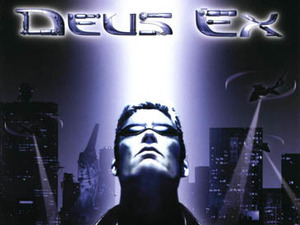
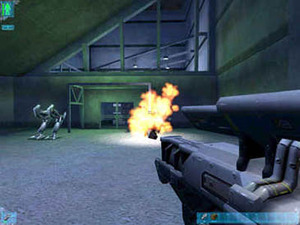 Before long, everyone is a puppet, and as you start learning who really pulls the strings it becomes ever more tangled. Decisions have clear consequences, but not quite such clear morality or ethics. It takes little time before you think you know who the "good guy" is, and then find out you may have misplaced your allegiances.
Before long, everyone is a puppet, and as you start learning who really pulls the strings it becomes ever more tangled. Decisions have clear consequences, but not quite such clear morality or ethics. It takes little time before you think you know who the "good guy" is, and then find out you may have misplaced your allegiances.
Deus Ex was followed by a sequel in 2003, but that met with some pretty bad reception. Much like Thief: Deadly Shadows it was again a partnership between Ion Storm and Eidos, trying to release a blockbuster title for the XBox more than the PC. DX2 suffered from very similar problems to T:DF, as well - poor interface design, long loads that were unnecessary for a PC, and vastly underpowered graphics. The community tried to save the game with its own updated texture packs, but there was little to fix such a weak game. Ion Storm even added insult to injury by officially denouncing the packs, in effort to stand behind what it hoped would be an XBox fan base that never materialized.
The revolutionary gameplay of the original was brought to us via a modified Unreal engine in 2000, but definitely had some bugs. The catastrophic flop of the sequel meant we'll probably never see a renewed publisher interest in the title - but a simple update to the graphics and physics along with some bug-fixing love would probably make this be a top game all over again.
The game is set in a real cyberpunk style future, where the protagonist is a young hacker who gets caught. Rather than pressing charges, though, the hacking target proposes a deal - hack a particularly important mainframe, remove some AI restrictions, hand over control, and all the charges will be dropped. On top of that, you get a nice new military-issue enhancement, all expenses paid. It's only when you awake from that surgery that you see what hell you've created - the computer you hacked is now in control of an army of cyborgs and mutants, and you're one of the few still alive.
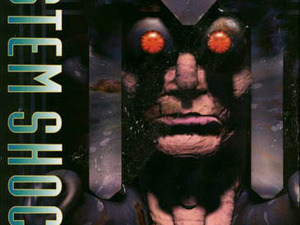
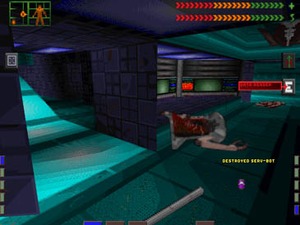 System Shock met with somewhat limited commercial success, despite being one of the most well-written and executed stories in FPS history. Its low-boil sales are largely attributable to the climate at the time - Doom had only been released a few months before, and the more clearly action-oriented play was madly popular. However, that never stopped the game from developing a tremendous following over time - many people only learned about it after the stars who created it went on to develop other great franchises, though.
System Shock met with somewhat limited commercial success, despite being one of the most well-written and executed stories in FPS history. Its low-boil sales are largely attributable to the climate at the time - Doom had only been released a few months before, and the more clearly action-oriented play was madly popular. However, that never stopped the game from developing a tremendous following over time - many people only learned about it after the stars who created it went on to develop other great franchises, though.
Nowadays, System Shock is not-so-shockingly in need of an update. Thirteen years in the "Best of..." bin will do that to you, but unfortunately this one hasn't had quite the same attention as some of the other greats in this article. Mainly, the lack of a source code release has prevented source ports from bringing the game to modern systems - the only real way to run the program now is with a DOS emulator like DOSBox.
In actuality, there is more of a story than that. Supposedly, anyhow. If you read the wiki, it's in there. Maybe it was in the manual? Who knows, who cares. Anyhow, after your first trip to Hell in the first game, you come back to Earth - to find it overrun with the same demonic invasion as Phobos was. Man, if people hear about this, they might start to think you're trouble - it's a good thing you're armed well enough that they won't say it to your face.
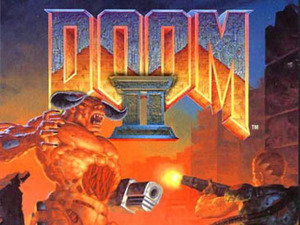
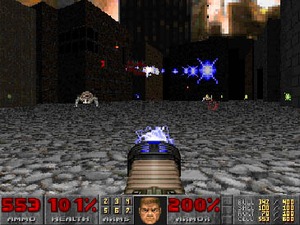 Doom 2 had many benefits over the original, in my book. For starters, the absolute lack of a real story and the purely fictional locality made it easy for the levels to be more about puzzles, traps and unique design than about consistently emulating some kind of theme throughout. The guys at id really stretched the boundaries of traditional level layouts with this new freedom, adding a much greater level of depth. New enemies, weapons, and items were added to aid you, but you really didn't have to think about where it all came from. Nowadays, this would put a game in the rubbish bin - but back then it didn't only seem unnecessary to question, it added to the fun.
Doom 2 had many benefits over the original, in my book. For starters, the absolute lack of a real story and the purely fictional locality made it easy for the levels to be more about puzzles, traps and unique design than about consistently emulating some kind of theme throughout. The guys at id really stretched the boundaries of traditional level layouts with this new freedom, adding a much greater level of depth. New enemies, weapons, and items were added to aid you, but you really didn't have to think about where it all came from. Nowadays, this would put a game in the rubbish bin - but back then it didn't only seem unnecessary to question, it added to the fun.
This is the one game I would have to say I hope only ever gets a graphics update - no new physics, here. There is something satisfying about a game where you fall for indefinite time and land unscathed. The auto-aiming vertically at enemies above and below you just somehow makes sense as you spray and spray the area with plasma.
If you ever get the interest to revisit this great old classic, fear not - the entire Doom and Heretic series are source-ported onto pretty much every operating system by the lovely freeware projects Chocolate Doom and Doomsday. Though they aren't quite as satisfying as seeing this game graphically remastered, they at least retain good fidelity to the original.
Even in modern games with greatly improved graphics, many games end up a waste on the retail shelf. Those that people do buy are often doomed to be one-hit wonders, sometimes not even justifying more than one or two plays through. How long will you really play F.E.A.R.? Others are classics in waiting, like Half Life 2 or FarCry... but those don't quite need an update yet.
Instead, let's take a look at a few that have stood a real test of time - the youngest of these games is six years old, and yet all three are referenced as if common parlance among gamers.
Deus Ex
First of all, Deus Ex isn't a straight FPS. It's more of a hybrid between an FPS and an RPG - but since it has many more traditional FPS features than RPG features, we're putting it here instead. Whatever you classify it as, the game is without a doubt one of the most innovative in either genre in recent times. When developed initially in 2000 by Ion Storm and published by Eidos, it was welcomed with massive response and an almost cult-like following.The story follows our hero JC Denton, who starts out as a rather uninformed rookie in the United Nations Anti-Terrorism Coalition (UNATCO). Your first mission makes things look so simple - stop the terrorists from their plot at the top of the Statue of Liberty, save the day, be a hero. If only it were so simple. As the game progresses, you become increasingly aware of the dystopian world (set in the near future) that you live in - factions are warring for power, some in the shape of religion, some in the shape of government.


Deus Ex was followed by a sequel in 2003, but that met with some pretty bad reception. Much like Thief: Deadly Shadows it was again a partnership between Ion Storm and Eidos, trying to release a blockbuster title for the XBox more than the PC. DX2 suffered from very similar problems to T:DF, as well - poor interface design, long loads that were unnecessary for a PC, and vastly underpowered graphics. The community tried to save the game with its own updated texture packs, but there was little to fix such a weak game. Ion Storm even added insult to injury by officially denouncing the packs, in effort to stand behind what it hoped would be an XBox fan base that never materialized.
The revolutionary gameplay of the original was brought to us via a modified Unreal engine in 2000, but definitely had some bugs. The catastrophic flop of the sequel meant we'll probably never see a renewed publisher interest in the title - but a simple update to the graphics and physics along with some bug-fixing love would probably make this be a top game all over again.
System Shock
System Shock is literally a Who's Who of the game design universe, touched by the hands of almost everyone who was anyone in 1994. The game was dreamed up by Warren Spector (later the creator of Deus Ex, above), developed by Looking Glass (of the Thief franchise), and published by Origin Systems (of Ultima fame). There has rarely been such a super-star team, and the game was all the better for it.The game is set in a real cyberpunk style future, where the protagonist is a young hacker who gets caught. Rather than pressing charges, though, the hacking target proposes a deal - hack a particularly important mainframe, remove some AI restrictions, hand over control, and all the charges will be dropped. On top of that, you get a nice new military-issue enhancement, all expenses paid. It's only when you awake from that surgery that you see what hell you've created - the computer you hacked is now in control of an army of cyborgs and mutants, and you're one of the few still alive.


Nowadays, System Shock is not-so-shockingly in need of an update. Thirteen years in the "Best of..." bin will do that to you, but unfortunately this one hasn't had quite the same attention as some of the other greats in this article. Mainly, the lack of a source code release has prevented source ports from bringing the game to modern systems - the only real way to run the program now is with a DOS emulator like DOSBox.
Doom II: Hell on Earth
There are games that are good, there are games that are fun, and then there are just games that are good fun. id Software's follow-up to the ultimate daddy of the FPS genre was exactly that - Doom 2 is straight out, unapologetic, grab-the-double-barrel good fun. You want a story? You're going to hell. Again. There's your story. Now grab a gun, quit whining and start shooting, space marine - there's a lot to kill.In actuality, there is more of a story than that. Supposedly, anyhow. If you read the wiki, it's in there. Maybe it was in the manual? Who knows, who cares. Anyhow, after your first trip to Hell in the first game, you come back to Earth - to find it overrun with the same demonic invasion as Phobos was. Man, if people hear about this, they might start to think you're trouble - it's a good thing you're armed well enough that they won't say it to your face.


This is the one game I would have to say I hope only ever gets a graphics update - no new physics, here. There is something satisfying about a game where you fall for indefinite time and land unscathed. The auto-aiming vertically at enemies above and below you just somehow makes sense as you spray and spray the area with plasma.
If you ever get the interest to revisit this great old classic, fear not - the entire Doom and Heretic series are source-ported onto pretty much every operating system by the lovely freeware projects Chocolate Doom and Doomsday. Though they aren't quite as satisfying as seeing this game graphically remastered, they at least retain good fidelity to the original.

MSI MPG Velox 100R Chassis Review
October 14 2021 | 15:04









Want to comment? Please log in.